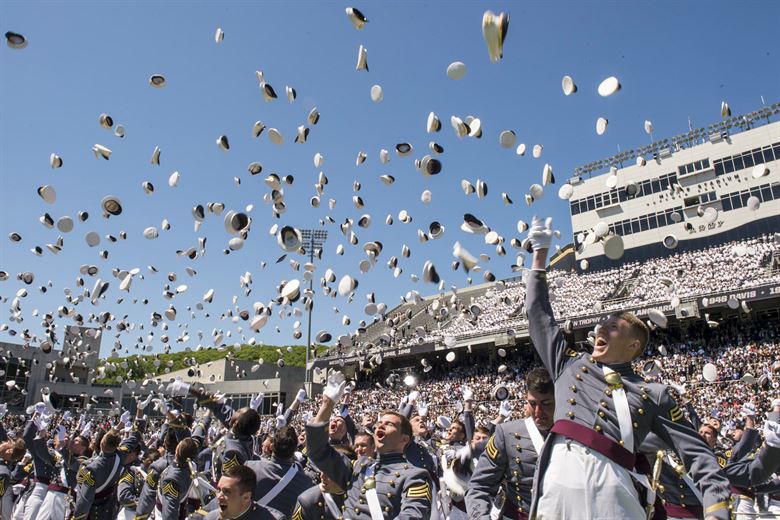 Graduates from the U.S. Military Academy toss their hats into the air after their graduation and commissioning ceremony at the academy in West Point, N.Y., May 23, 2015. DoD photo by D. Myles Cullen
Graduates from the U.S. Military Academy toss their hats into the air after their graduation and commissioning ceremony at the academy in West Point, N.Y., May 23, 2015. DoD photo by D. Myles Cullen
On June 2, graduation day at the United States Military Academy, the class of 2019 pushed the total number of Jewish West Point graduates past the 1,000 mark. I volunteered to chair the event recognizing the milestone but didn’t count on how much I would learn.
Jews have been part of West Point since Simon Levy joined the first class of 1802. He was the first of the “tribe” that is still flourishing as an integral part of the military academy, whose leafy campus is situated along the Hudson River in upstate New York. I am an older grad (1955-59) who remembers being asked if there were other Jewish students. It’s clear that over time, the West Point Jewish experience is a story not fully recognized, but times have changed. The landmark 1,000th Jewish graduate acknowledges a bond between the Jewish community, West Point and our nation. We embrace as full partners. This was palpable when I corresponded with so many of our invited alumni.
When I was a cadet, religious affiliation and attendance were required. All cadets marched to a small chapel located at the post cemetery on Sundays. Our services were conducted by a visiting rabbi or cadet. They were held in an old cadet chapel; we just covered existing religious items that were present. Don’t get the wrong idea. If desired, cadets could maintain a kosher food regimen. Being Jewish was not a problem.
Change came. A group of graduates and non-graduates saw the need for a Jewish chapel, and so they raised funds. Now, as the West Point Jewish Chapel Fund, it provides support for chapel maintenance and Jewish cadet activities. Change is often slow but I got an awakening to life as it is today. It is tougher academically and physically and everyone thrives together. And the U.S. Military Academy supported our special milestone. The superintendent spoke at our baccalaureate and stayed for our oneg. We all appreciated that visit and his obvious enjoyment.
The Jewish choir has performed at synagogues, at the White House for two previous presidents, and at the United Nations. I missed the breadth of that excitement. There is a thriving Hillel program, trips to Israel with Birthright and other international trips — most recently to Brazil. I missed that. Women are 25% of the corps today. Missed it. There’s a Jewish Warriors’ Weekend with other academies’ and colleges’ students, whose goal is to share what Jewish West Point life is like and the importance of the academy’s motto: Duty, Honor, Country. Missed that. An annual plebe (freshmen) retreat where new plebes meet all chapel cadets and the chaplain. Missed that. The annual celebration of the life of Col. Mickey Marcus, a Jewish West Point graduate, who died fighting for Israel and is buried at West Point. Missed that, too.
But how terrific is it that it all happens. An annual seder is still held, often attended by senior West Point officers. The Jewish Chapel is critical to a flourishing Jewish life at West Point. Its website provides a link to Jewish graduates to see events at “their” chapel. It is also a place of worship for civilians based at West Point. And cadets train to be lay leaders certified to conduct services when no chaplain is available.
In 1984, the Jewish Chapel joined the landscape in continuing a legacy of openness, learning and standing tall for the principles of peace, love, honor and strength. 1802: a start. 2019: a milestone. With this milestone, the West Point Jewish Chapel and Jewish graduates feel the deeply etched relationship with their historic and revered alma mater, West Point. n
West Point Jewish Chapel Fund is not affiliated with, nor speaks for West Point. It is an independent organization supporting the Jewish Chapel cadet activities.
Joel Kampf is a member of the West Point Jewish Chapel Board.






















 More news and opinions than at a Shabbat dinner, right in your inbox.
More news and opinions than at a Shabbat dinner, right in your inbox.